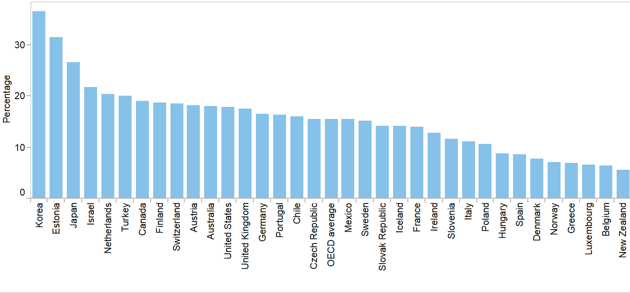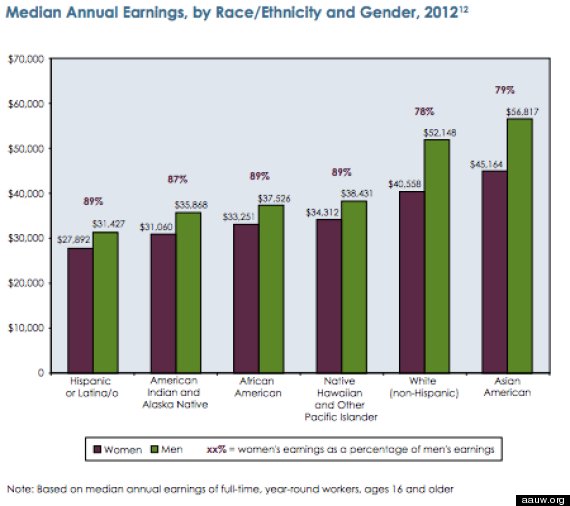Mind the Gender Pay Gap

You’ve probably heard that men get paid more than women, but what does that really mean? Some suggest it's due to the choices women make. Is this true? Are women paid less because they choose lower-paying jobs? Is it because more women work part time than men do? Or is it because women have more care-giving responsibilities? On that last note, it is not like we were given a biological choice, right?
The recent Sony hack shed light on a conversation we should be taking more seriously. The hack leaked information revealing, among many other things, that many female actors, even though considered highly paid in the industry, earn far less income than their male counterparts. Yes, women have come a long way since the Suffragette era, but should we stop and conform to norms just because we have more rights than before? Has everything been done and exhausted in the department of gender equality? No. But it takes high-profile people (like famous actors) bringing up the subject to start a wide conversation on the subject.
Business Insider reported recently that Bradley Cooper will start sharing his salary information with other female co-stars. Even though that is a thoughtful stance, it will not be enough to raise awareness on the issue. We need more men to join this conversation, educate themselves on the matter, and support equal pay because in the end it will affect men indirectly, whether through marriage (a wife earning less than her potential) or family relationship (a daughter earning less than a son, a single-mother earning less than her married counterpart). How would they feel if there was a rule that they had to pay more for products because they earn more?
Jennifer Lawrence, who has co-stared with Bradley Cooper in many movies, has made it clear through social media, and through her contribution to Lena Dunham’s blog, how she feels about the gender pay gap: "When the Sony hack happened and I found out how much less I was being paid than the lucky people with dicks, I didn’t get mad at Sony. I got mad at myself." She continues that she thought twice before she became “difficult” or “spoiled” because she didn’t want to “offend” or “scare” men during her salary negotiations. Later, much later for that matter, she realized that “[she doesn’t] think [she] ever worked for a man in charge who spent time contemplating what angle he should use to have his voice heard. It’s just heard… If anything, [she is] sure they were commended for being fierce and tactical, while [she] was busy worrying about coming across as a brat…For some reason [she] just can’t picture someone saying that about a man.”
Even though JLaw realizes that “not everyone can relate to her problems” because of her immense yearly income in relation to the average American, she does bring up a valid point that affects “commoners” as well, and it is backed up by statistics and studies. She undoubtedly brings up the double standard that exists not only in a society of a developed country, the US, but throughout the world.
Here are some facts:
The US 's wage gap is at 17.91 percent. Earlier this year the OECD released a Gender wage gap chart that shows inequality is real. The Atlantic calls it a global problem.
In 2013 the female-to-male earnings ratio was 0.82, slightly higher than the 2010 ratio (0.79). The female-to-male earnings ratio of 0.82 means that, in 2013, the average female full-time worker earned 18% less than the average male full-time worker. Bitchmedia.org, a feminist quartely magazine, explains that gap could grow if race and ethnicity are added to the equation as shown in the chart below.
The Huffington Post mentions that "while the pay gap takes into account factors such as college major and type of job pursued after graduation, there is still a large part that can’t be explained by individual choice. In a 2012 analysis, AAUW found that even after controlling statistics for occupation, industry, hours, work experience, college major, religion, race/ethnicity, GPA, education, number of children and marital status, women are paid only 82 percent of what their male peers are earning just a year after college graduation. Ten years out of college, and the gap widens with women earning a 69 percent of what men earn."
At that rate, humanity might start living on Mars before women start earning as much as men do here on earth.
[Photo credits: The Atlantic, and AAUW, Video: ABCNews; YouTube.com]









